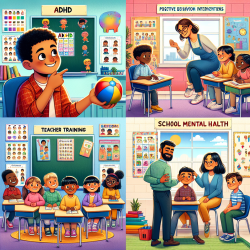Introduction
Incarceration is a societal issue that extends beyond the prison walls, affecting not just the incarcerated individuals but also their families, particularly children. With an increasing number of parents being incarcerated, it is crucial for practitioners, especially those involved in speech-language pathology and online therapy services like TinyEYE, to understand the impact of parental incarceration on children and how they can be supported.
Understanding the Impact
The systematic review and meta-analysis by Murray, Farrington, and Sekol (2012) provides a comprehensive look into the effects of parental incarceration on children. The study synthesized results from 40 studies involving over 7,374 children with incarcerated parents and 37,325 comparison children. The findings indicate that parental incarceration is significantly associated with an increased risk of antisocial behavior in children. However, it does not show a strong correlation with mental health issues, drug use, or poor educational performance when covariates are controlled.
Key Findings
- Parental incarceration is associated with a 10% increased risk of antisocial behavior in children.
- There is no significant association with mental health problems, drug use, or educational performance after controlling for covariates.
- The methodological quality of many studies was poor, indicating a need for more rigorous research.
Implications for Practitioners
For practitioners, these findings highlight the importance of focusing on behavioral interventions for children with incarcerated parents. Here are some strategies practitioners can implement:
- Behavioral Interventions: Develop programs that specifically target antisocial behavior, incorporating positive reinforcement and social skills training.
- Parental Involvement: Encourage and facilitate communication between the child and the incarcerated parent, when appropriate, to maintain a sense of connection and support.
- Community Support: Collaborate with community organizations to provide additional support systems for affected children and their families.
Encouraging Further Research
The study also calls for more rigorous research to better understand the causal effects of parental incarceration on children. Practitioners are encouraged to engage in or support research efforts that explore these dynamics further, using randomized designs and longitudinal studies to draw more definitive conclusions.
Conclusion
Understanding the nuanced effects of parental incarceration on children is crucial for developing effective interventions. By focusing on data-driven strategies and encouraging further research, practitioners can play a pivotal role in mitigating the adverse effects and unlocking the potential of these children.
To read the original research paper, please follow this link: Children's Antisocial Behavior, Mental Health, Drug Use, and Educational Performance After Parental Incarceration.










